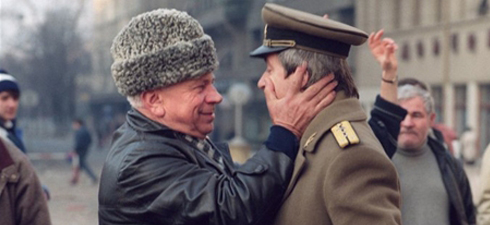On Saturday afternoon, 16 December 1989, several hundred faithful followers of [ethnic Hungarian] vicar László Tőkés gathered in front of his house in Timişoara to protest against his arrest and forced transfer to a remote village. Tőkés had long been under Securitate surveillance for his outspoken opposition to Ceauşescu. A crackdown ensued, leaving over 70 dead. On 21 December 1989, Nicolae Ceauşescu’s final address in Bucharest met with cries of “Down with Ceauşescu!” whereupon le conducător iubit [beloved chief] panicked and fled in a helicopter. The bloodbath that followed in Bucharest [over a thousand dead], even after 22 December – the official date of the regime change – still hasn’t been entirely cleared up.
Most of the ex-Securitate officers are still at large, either because not all their files have been handed over to the National Council for the Study of Securitate Archives (CNSAS), or because the Council has been denied the necessary resources to come up with clear-cut verdicts. The preliminary inquiry into the revolution files is still in progress. The charges against Ion Iliescu, the country’s president after Ceauşescu’s fall, who was accused of trying to justify war and genocide, and of being an accomplice to torture in the “mineriad” of 13–15 June 1990 [the new regime trucked in thousands of miners to help brutally suppress anti-government demonstrations in Bucharest], were dropped in June 2009. In the Timişoara Revolution trial, generals Mihai Chitac and Victor Atanasie Stanculescu were sentenced to 15 years in prison and dishonourable discharges, but the ruling was contested. And the report on the Communist dictatorship [by a presidential commission headed by political scientist Vladimir Tismăneanu] was not submitted to parliament till 2006.
Nestor Ratesh, ex-director of Radio Free Europe, observes that “the distinctive feature of the regime change in Romania was its violent nature”, unlike the other ex-Communist countries, e.g. Hungary, Czechoslovakia, Poland, where “the collapse of the Communist regime was peaceful and well-prepared”. Historian Marius Oprea, president of the Institute for the Investigation of Communist Crimes in Romania, feels that “if people hadn’t taken to the streets, the regime change would have been delayed till the spring of 1990”, but “television coverage helped legitimise the new regime”. Marius Oprea believes that in any case there was no way to negotiate the transition in Romania owing to the lack of reform within the Romanian Communist Party, where “the power pyramid was structured according to a feudal model and one sole voice made itself heard: that of Nicolae Ceauşescu”.
Execution without trial
What occurred on 22 December 1989, says Oprea, was merely the “decapitation of the Ceauşescu family”, after which the “second tier of the Communist party” took over. He claims that in fact more people died after that takeover than during the revolution itself: “The new regime used violence to legitimise itself.” Nestor Ratesh says “the revolution was spontaneous”. However, “The conspiracy element emerged on 22 December, when it became apparent that Ceauşescu could not remain in power. That was when they started drawing up programmes and power combinations in a fever of activity in the palace. When Ion Iliescu arrived, everything had already been put in place. The conspirators had already taken control over the television broadcasting. The rest was a matter of manipulation.”
And yet, Oprea concedes, “the transition to democracy was similar to that of other ex-Communist countries like the Czech Republic or Poland: like them, we went through a process of privatisation of Communism”. The old garde of the nomenklatura and their families assumed the party members’ responsibilities. Nicolae Ceauşescu’s execution on Christmas day, and without a real trial, was disparaged as a barbarous and reprehensible act by international public opinion. But historian Marius Oprea explains that in fact it was “beneficial”: “Otherwise, Nicolae Ceauşescu would in all likelihood have become a senator on the Socialist Labour Party ticket” [created in 1990 by formerly active Communist Party members to replace the CP].
Testimony
Ghost of the Securitate
“In 1983, while at university, I was invited to be interviewed at a travel agency, on the pretext of a translation job. It soon transpired that the man who interviewed me was a Securitate captain. He offered me privileges: a passport to travel abroad and the cancer drugs my sick father needed. In exchange I would have to spy on people I knew. I said no.” Writing in the Independent, the BBC’s European affairs correspondent Oana Lungescu reveals the circumstances in which the Romanian secret police tried to recruit her, remembering that to grow up under the Ceausescu dictatorship, ““you carried around a terrible certainty – one in 10 people was an informer."
On the 20th anniversary of the dictator’s fall, she describes the day she accessed her secret police file, two volumes amongst of two million “kept in three warehouses at a former military compound on the outskirts of the capital.” A student of English and Spanish at the time, she discovers “detailed reports about my visits to the British Council. Times, names of people I came or left with, car licence-plates. A staff member doubling as an informer is asked to check if I'd been chatting to another man they were watching…There's a handwritten report about my mother's departure; details about my 23-year-old boyfriend, whom they suspected of "espionage activities".” The experience, she confesses, was deeply liberating, and deeply unsettling. “An army of spies and scribes paid to collect trivial details about someone like me, a nobody. So many strangers who photocopied my letters, listened in to my phone calls. And for what?”
Was this article useful? If so we are delighted!
It is freely available because we believe that the right to free and independent information is essential for democracy. But this right is not guaranteed forever, and independence comes at a cost. We need your support in order to continue publishing independent, multilingual news for all Europeans.
Discover our subscription offers and their exclusive benefits and become a member of our community now!












